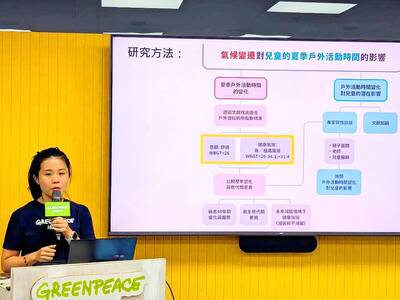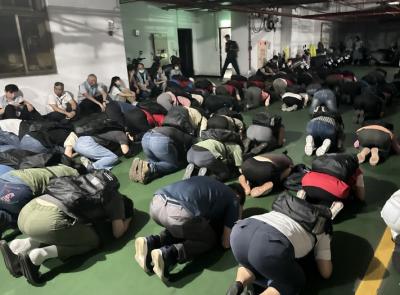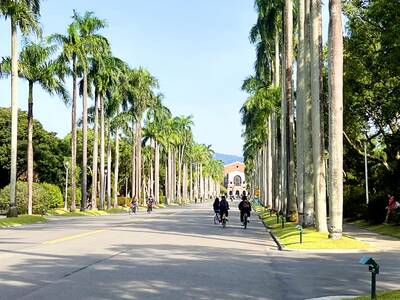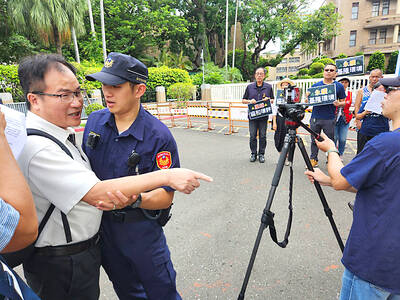Representatives from 10 APEC economies yesterday attended a National Health Insurance Administration (NHIA) event in Taipei to discuss how to improve digital healthcare data applications.
The APEC Workshop on Public-Private Collaboration in Supporting of Containing Measures During and Beyond Pandemic consisted of three sessions: Innovative care or delivery models developed by digital health technologies, Principles of heath data management and Case sharing on public-private healthcare collaboration.
Minister of Health and Welfare Hsueh Jui-yuan (薛瑞元) in the opening speech said that through the workshop, participating APEC economies could deepen their partnerships and establish networks to boost cooperation in the Asia-Pacific region.

Photo: Wu Liang-yi, Taipei Times
“Threats from communicable diseases persist, while new health challenges will emerge, so the ability to respond in a timely and effective manner is crucial,” Hsueh said.
“Digital health is important in responding to these challenges,” he said, adding that the COVID-19 pandemic highlighted the importance of digital health technologies.
Public-private collaboration can maximize the benefit of digital health technologies and accelerate their development, he said.
Minister of Digital Affairs Audrey Tang (唐鳳) said that the APEC economies have accelerated the use of digital technologies for healthcare and many aspects of life during the COVID-19 pandemic, but added that her ministry is concerned about the protection of personal data.
The data ministry is responsible for Taiwan’s data altruism policies — or how personal and non-personal data are voluntarily shared for the public interest — and it has drafted guidelines for the use of non-personal data, including public consultation processes and the use of privacy enhancement technologies, Tang said.
Hopefully, adopting the data altruism arrangements would enhance resilience, not only to prevent the next pandemic, but also to measure the pros and cons of the use of artificial intelligence (AI) technologies in medical and healthcare data, she said.
Taiwan produces advanced chips that can be used in edge AI training, she said, referring to the implementation of AI close to where the data are collected, rather than implementation at a centralized facility.
This would ensure that the data are not transmitted to the cloud or data centers, while providing insight swiftly, Tang said, adding that data altruism must be a priority in shaping more resilient healthcare systems.
NHIA Director-General Shih Chung-liang (石崇良) said at the event that the growth of telemedicine was accelerated by the COVID-19 pandemic, but further NHI reform and digital transformation are needed to overcome several challenges, including a rapidly aging population and increasing healthcare spending.
NHI reform and digital transformation include revision of telemedicine regulations to broaden application models, developing community-based home healthcare, promoting the virtual NHI card and the My Health Bank mobile app, establishing an NHI biobank to facilitate research and development, and improving other digital infrastructure, Shih said.
On the sidelines of a plenary session, Shih said that elderly people account for about 17 percent of Taiwan’s population and the ratio is expected to reach 20 percent in 2025 and 30 percent in 2040.
Given the healthcare needs of an aging society, community-based home healthcare must be developed, he said.
Home healthcare, telemedicine and remote monitoring are essential for people to receive the same healthcare at home or in long-term care facilities as they would in a hospital, he said.
The NHIA next year would broaden eligibility for telemedicine through pilot programs, including by allowing some residents of long-term healthcare facilities to seek medical attention using telemedicine, without needing to visit a hospital, he said.
Common acute conditions for people in at-home care or in long-term care facilities are infections, such as pneumonia or urinary tract infections, so if they can be treated with antibiotics, they would not need hospitalization, he said.
However, the health ministry needs to draft amendments to relax regulations to allow prescriptions via telemedicine, Shih said.

The government should improve children’s outdoor spaces and accelerate carbon reduction programs, as the risk of heat-related injury due to high summer temperatures rises each year, Greenpeace told a news conference yesterday. Greenpeace examined summer temperatures in Taipei, New Taipei City, Taoyuan, Hsinchu City, Taichung, Tainan and Kaohsiung to determine the effects of high temperatures and climate change on children’s outdoor activities, citing data garnered by China Medical University, which defines a wet-bulb globe temperature (WBGT) of 29°C or higher as posing the risk of heat-related injury. According to the Central Weather Administration, WBGT, commonly referred to as the heat index, estimates

Taipei and other northern cities are to host air-raid drills from 1:30pm to 2pm tomorrow as part of urban resilience drills held alongside the Han Kuang exercises, Taiwan’s largest annual military exercises. Taipei, New Taipei City, Keelung, Taoyuan, Yilan County, Hsinchu City and Hsinchu County are to hold the annual Wanan air defense exercise tomorrow, following similar drills held in central and southern Taiwan yesterday and today respectively. The Taipei Mass Rapid Transit (MRT) and Maokong Gondola are to run as usual, although stations and passenger parking lots would have an “entry only, no exit” policy once air raid sirens sound, Taipei

Taipei placed 14th in the Quacquarelli Symonds (QS) Best Student Cities 2026 list, its highest ever, according to results released yesterday. With an overall score of 89.1, the city climbed 12 places from the previous year, surpassing its previous best ranking of 17th in 2019. Taipei is “one of Asia’s leading higher-education hubs,” with strong employer activity scores and students “enjoying their experience of the city and often keen to stay after graduation,” a QS staff writer said. In addition to Taipei, Hsinchu (71st), Tainan (92nd), Taichung (113th) and Taoyuan (130th) also made QS’ list of the top 150 student cities. Hsinchu showed the

Environmental groups yesterday filed an appeal with the Executive Yuan, seeking to revoke the environmental impact assessment (EIA) conditionally approved in February for the Hsieh-ho Power Plant’s planned fourth liquefied natural gas (LNG) receiving station off the coast of Keelung. The appeal was filed jointly by the Protect Waimushan Seashore Action Group, the Wild at Heart Legal Defense Association and the Keelung City Taiwan Head Cultural Association, which together held a news conference outside the Executive Yuan in Taipei. Explaining the reasons for the appeal, Wang Hsing-chih (王醒之) of the Protect Waimushan Seashore Action Group said that the EIA failed to address